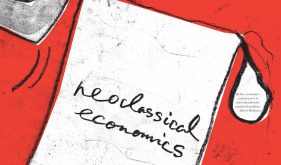Mark Lilla et la gauche identitaire [embedded content]
Read More »Macroeconomic uncertainty
The financial crisis of 2007-08 hit most laymen and economists with surprise. What was it that went wrong with our macroeconomic models, since they obviously did not foresee the collapse or even make it conceivable? There are many who have ventured to answer this question. And they have come up with a variety of answers, ranging from the exaggerated mathematization of economics to irrational and corrupt politicians. But the root of our problem goes much deeper. It ultimately...
Read More »Tina Turner Turns 80
Tina Turner Turns 80 [embedded content][embedded content] Congratulations Tina. Tu es tout simplement incroyable. Simply the best!
Read More »RCTs — assumptions, biases and limitations
RCTs — assumptions, biases and limitations Randomised experiments require much more than just randomising an experiment to identify a treatment’s effectiveness. They involve many decisions and complex steps that bring their own assumptions and degree of bias before, during and after randomisation … Some researchers may respond, “are RCTs not still more credible than these other methods even if they may have biases?” For most questions we are interested in,...
Read More »Serenity
[embedded content] Sublime, breathtaking, and absolutely magnificent heavenly music!
Read More »Randomised controlled trials — a retreat from the bigger questions
Randomised controlled trials — a retreat from the bigger questions Nobel prizes are usually given in recognition of ideas that are already more or less guaranteed a legacy. But occasionally they prompt as much debate as admiration. This year’s economics award, given to Abhijit Banerjee, Esther Duflo and Michael Kremer … recognised the laureates’ efforts to use randomised controlled trials (RCTs) to answer social-science questions … RCT evangelists sometimes...
Read More »1855 — the birth of causal inference
1855 — the birth of causal inference [embedded content] If anything, Snow’s path-breaking research underlines how important it is not to equate science with statistical calculation. All science entail human judgement, and using statistical models doesn’t relieve us of that necessity. Working with misspecified models, the scientific value of statistics is actually zero — even though you’re making valid statistical inferences! Statistical models are no...
Read More »Claire obscure
När jag ser de sista skälvande solstrålarna kasta sitt förföriska ljus och lysa upp mitt hem tycker jag mig ana det rofyllda gulaktiga nordiska skymningsljusets förmåga att försänka oss i en vag och obestämt transcendental känsla av existentiell mystik …
Read More »Scary mudpacks (personal)
Wife and two of our daughters trying to scare yours truly on a Friday evening …
Read More »Economics — enslaved by the wrong theory
Economics — enslaved by the wrong theory The more I learned about economics, the more I discovered a landscape that is surpassingly strange. Like the land of Mordor, it is dominated by a single theoretical edifice that arose like a volcano early in the 20th century and still dominates the landscape. The edifice is based upon a conception of human nature that is profoundly false, defying the dictates of common sense, before we even get to the more refined...
Read More » Lars P. Syll
Lars P. Syll






